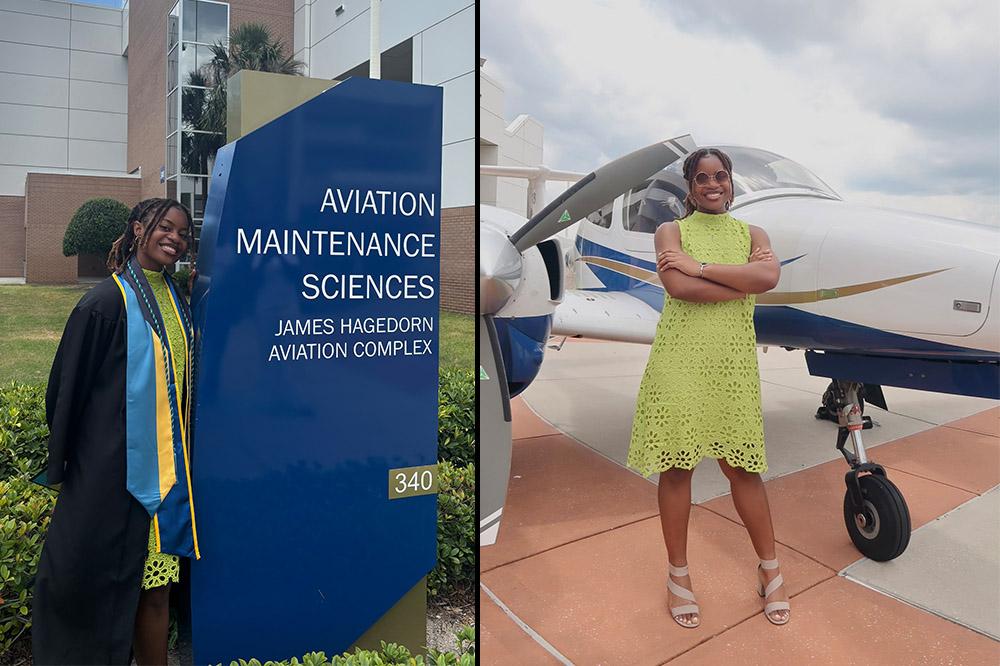
Association for Women in Aviation Maintenance scholarship winner Antonique Greenslade is only the third woman from the Bahamas to receive an airframe and powerplant certification from the FAA. She spoke with Aviation Week Network right after her college graduation about her journey into the industry and shared words of encouragement for other young people trying to break into MRO careers.
Could you tell me a bit about yourself and how you got interested in aviation maintenance?
It all started at the age of 16. I took a discovery flight, and that changed my whole life. I applied at Embry-Riddle [Aeronautical University] and, shortly after, I realized how expensive it was to get into flying, so I figured I would just take a break on that and verge into something different within the same field, so that's where maintenance came in. It was the cheapest and quickest program at Embry-Riddle. I took that route and instantly fell in love with working with my hands.
You’re originally from the Bahamas. What was the process like going to school and applying for jobs in a different country?
I was the first person in my family to attend college, so it was 10 times more difficult to come here and make sure all of the visa processes and things were up to date and up to standard. As an international student, you're already behind. At career fairs, I would talk to companies and submit my resume and most of them would say, “No, sorry, we can’t make that commitment because you’re international and [it is too difficult] to pay for visas,” which I get from a business standpoint. But through all that, I just never gave up, and I managed to find a company that was willing to sponsor me, but it's definitely really hard. It’s something that a lot of international students are going through, and I just try help them as best as I can. Professors have told me that most international students would thrive better if given a chance, because coming from a country where there's little to no aviation to a land of opportunities, you get to really embrace [it] and spread your wings.
Besides dealing with the barriers to entry of being an international student, what have been your biggest challenges while studying to become an aviation maintenance technician?
The most challenging thing was being surrounded by a lot of guys. There weren't a lot of females in the field when I started. Looking around the classroom and only seeing guys could have been a bit intimidating. Guys like to just get straight to work, and females take our time and reread the instructions. But I grew up with brothers, so it was easier for me to adjust to.
For the women out there, I would definitely say keep your head up and don't get intimidated by all of the guys. Always put your best out, because you have to try to stand out more being a female in this field. Also, never give up. It can become very hard and overwhelming during exams and tests, especially your orals and practicals—it’s a lot at once. Just keep pursuing what you really want to do and always find joy out of it. It’s really hard and it’s tedious, but it's very rewarding in the end.
During your studies, you’ve worked in maintenance for a couple airlines in the Bahamas. What was your experience with that?
The first place I worked at was an internship for Bahamas Air, our national flag carrier. It was an interesting experience. The youngest guy there was like 35 and then it was me at 17, so that was a big age gap. It was kind of hard to mingle, but I managed to walk around the floor and introduce myself and hold conversations with everyone. But that was very different, because as you get up in age, you move slower and you become less driven, so I was kind of that driving force behind everyone in the hangar and I learned a lot.
The next company I went to was Trans Island Airways, a small charter company, and that's where I found my love for corporate aviation. It was just me and one other guy who was closer to my age group, so we kind of related and talked and joked around every day, but we also got the work done. That was a healthy environment for me to thrive, find my passion and be more ambitious, and I got to do everything from taxiing to towing the aircraft and so much more.
Where are you currently in your aviation maintenance career journey, and what are your career aspirations?
I now have my airframe and powerplant license and I just graduated with my associate’s degree. I have a job lined up with a company called American Aviation down in Brooksville, Florida. Later down the line, I see myself being a director of maintenance or manager of some kind, or perhaps owning a business. I find being a travel mechanic really interesting. I met a few individuals working for Executive Jet Management who, after they put in their years, are just flying with and working with the planes.





